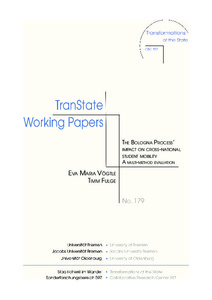The Bologna Process' impact on cross-national student mobility. A multi-method evaluation
"The Bologna Process (BP) has induced a remarkable amount of structural higher education policy change in its participating countries. From a program-theoretical perspective, one of the main benefits associated with these changes is thought to be increased student mobility between participating...
| Main Authors: | , |
|---|---|
| Institution: | ETUI-European Trade Union Institute |
| Format: | TEXT |
| Language: | German |
| Published: |
Bremen
2013
Universität Bremen |
| Subjects: | |
| Online Access: | https://www.labourline.org/KENTIKA-19122063124919402459-The-Bologna-Process-impact-on-.htm |
| _version_ | 1771659896475877377 |
|---|---|
| author | Vögtle, Eva Maria Fulge, Timm |
| author_facet | Vögtle, Eva Maria Fulge, Timm |
| collection | Library items |
| description | "The Bologna Process (BP) has induced a remarkable amount of structural higher education policy change in its participating countries. From a program-theoretical perspective, one of the main benefits associated with these changes is thought to be increased student mobility between participating countries. However, due to a lack of suitable data and the highly heterogeneous nature of the newly-formed European Higher Education Area (EHEA), it has thus far remained unclear whether student mobility has indeed increased and, if it has, whether countries benefit evenly. In this paper, we aim to evaluate (1) whether the Bologna Process has led to an increase in degree seeking student mobility within as well as beyond the EHEA and (2) whether the exchange relationships are balanced. Drawing from previous literature on student mobility, we isolate the impact of BP membership from other factors hypothesized to shape mobility flows. Methodologically, we employ a two-fold approach: First, we conduct time-series-cross-section (TSCS) analyses of both in- and outbound degree seeking student mobility ratios, establishing which factors account for the overall attractiveness of higher education systems. Secondly, we take a dyadic approach in order to analyze push and pull factors between pairs of countries. In short, we find that while membership in the Bologna Process does not have an impact on inbound mobility ratios, outbound mobility ratios have indeed increased within the group of BP members. However, although participation in the BP per se does not further inbound mobility or relevance of exchange relationships, cross-national student exchange patterns within this group are more balanced compared to those of non-participants. In conclusion, the BP has failed to establish the EHEA as a favorite destination for degree seeking student mobility." |
| format | TEXT |
| geographic | EU countries |
| id | 19122063124919402459_ea0bd9f64d584319bb98eb1c78d1fc1d |
| institution | ETUI-European Trade Union Institute |
| is_hierarchy_id | 19122063124919402459_ea0bd9f64d584319bb98eb1c78d1fc1d |
| is_hierarchy_title | The Bologna Process' impact on cross-national student mobility. A multi-method evaluation |
| language | German |
| physical | 42 p. Digital |
| publishDate | 2013 |
| publisher | Bremen Universität Bremen |
| spellingShingle | Vögtle, Eva Maria Fulge, Timm higher education labour mobility student The Bologna Process' impact on cross-national student mobility. A multi-method evaluation |
| thumbnail | https://www.labourline.org/Image_prev.jpg?Archive=109815792709 |
| title | The Bologna Process' impact on cross-national student mobility. A multi-method evaluation |
| topic | higher education labour mobility student |
| url | https://www.labourline.org/KENTIKA-19122063124919402459-The-Bologna-Process-impact-on-.htm |

